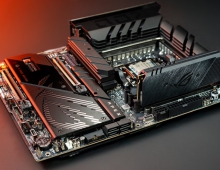
AMD Demonstrates Accelerated Computing Solution that Breaks Teraflop Barrier
AMD showcased a single-system, Accelerated Computing platform that breaks the teraflop computing barrier.
At a press event in San Francisco, AMD demonstrated a "Teraflop in a Box" system running a standard version of Microsoft Windows XP Professional that harnessed the power of AMD Opteron dual-core processor technology and two next-generation AMD R600 Stream Processors capable of performing more than 1 trillion floating-point calculations per second using a general "multiply-add" (MADD) calculation. The R600 graphics chip is expected to be released by the end of June.
In the supercomputing field, "flops" is an acronym meaning FLoating point Operations Per Second, a measure of a computer?s ability to perform floating point calculations. A teraflop is one trillion floating point operations per second.
This achievement represents a ten-fold performance increase over today?s high-performance server platforms, which deliver approximately 100 billion calculations per second.
Platforms based on the same technology found in the "Teraflop-in-a-Box" demonstration should benefit a wide range of scientific and commercial applications, including energy, financial, environmental, medical, scientific, defense and security organizations.
Barcelona Quad-core Sifgnificantly faster
At the same press event in San Francisco, AMD siad that the upcoming Barcelona processor will sport floating-point performance 42 percent higher than Intel's current top-of-the line CPU, the Xeon X5355 also known as Clovertown.
The news marked the first performance numbers AMD has provided for the chip that packs four Opteron cores on a single die and will be in production this fall.
Mario Rivas, general manager of AMD's microprocessor group, said Barcelona will provide a double-digit leap in integer performance over the quad-core Xeon.
Although the floating point advantage is significant, few applications outside high performance computing and video encoding make use of it.
In the supercomputing field, "flops" is an acronym meaning FLoating point Operations Per Second, a measure of a computer?s ability to perform floating point calculations. A teraflop is one trillion floating point operations per second.
This achievement represents a ten-fold performance increase over today?s high-performance server platforms, which deliver approximately 100 billion calculations per second.
Platforms based on the same technology found in the "Teraflop-in-a-Box" demonstration should benefit a wide range of scientific and commercial applications, including energy, financial, environmental, medical, scientific, defense and security organizations.
Barcelona Quad-core Sifgnificantly faster
At the same press event in San Francisco, AMD siad that the upcoming Barcelona processor will sport floating-point performance 42 percent higher than Intel's current top-of-the line CPU, the Xeon X5355 also known as Clovertown.
The news marked the first performance numbers AMD has provided for the chip that packs four Opteron cores on a single die and will be in production this fall.
Mario Rivas, general manager of AMD's microprocessor group, said Barcelona will provide a double-digit leap in integer performance over the quad-core Xeon.
Although the floating point advantage is significant, few applications outside high performance computing and video encoding make use of it.





















